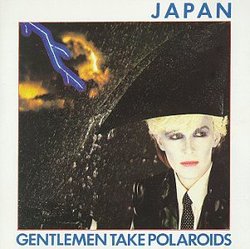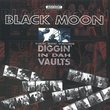| All Artists: Japan Title: Gentlemen Take Polaroids Members Wishing: 2 Total Copies: 0 Label: Blue Plate Caroline Release Date: 9/13/1991 Genres: Alternative Rock, Pop, Rock Styles: Hardcore & Punk, New Wave & Post-Punk, Progressive, Progressive Rock Number of Discs: 1 SwapaCD Credits: 1 UPC: 017046182928 |
Search - Japan :: Gentlemen Take Polaroids
 | Japan Gentlemen Take Polaroids Genres: Alternative Rock, Pop, Rock
Limited edition remastered Japanese pressing of this album comes housed in a miniature LP sleeve. EMI. 2008. |
Larger Image |
CD DetailsSynopsis
Album Description Limited edition remastered Japanese pressing of this album comes housed in a miniature LP sleeve. EMI. 2008. Similar CDs
Similarly Requested CDs
|
CD ReviewsThe cornerstone of new wave, the apex of a brilliant career. B. G. Shultz | Rockwall, TX USA | 11/14/2003 (4 out of 5 stars) "Sometime around 1979 or so, the members of British rock band Japan had an identity crisis. They realized that the disco/hard rock/New York Dolls sound they were pursuing was not resulting in major record sales. Their second album, "Obscure Alternatives", was barely passable, and it must have been quite obvious to Japan that the future of their musical career was in question. So they did something very unexpected: they jumped over onto the Kraftwerk/Gary Numan/Devo highway, changed their hairstyles in a radical fashion, and recorded a smashing album called "Quiet Life", which many believe to be the first real New Wave or New Romantic album. Singer David Sylvian changed his raspy sass of a singing voice to a smooth pair of pipes that managed to be sensual, smart, and sentimental all at the same time. Unlike Numan and the others, Japan was able to sound human and emotional, mechanical bleeps and blurbs notwithstanding. Their rhythm section alone set them apart from their contemporaries, consisting as it did of Sylvian's hard-hitting yet jazzy brother on drums, and some wildman bassist throwing out fretless licks all over the place. Anyway, "Gentlemen..." was Japan's second album as a New Wave band, and features a cool, dancy, happyish title track, a slinky little number called "Swing", a couple of instrumentals that are kind of eerie ("The Art of Swimming" makes me think of someone skinny dipping in a dreary indoor pool in the Soviet Union, sometime in the winter of 1981 or so), an extraordinarily well-written and moving ditty called "Methods of Dance" (with some Japanese girl on background vocals in the chorus, and a great saxophone part), and a yearning piano and vocal masterpiece that calls itself "Nightporter", which hints at things naughty and beautiful. The other songs are great as well. Buy this album if you're the slightest bit interested in the why's and wherefore's of early 80's dance-pop." Never fully understood or appreciated. Swing Out Mister | SF, CA | 11/01/2004 (5 out of 5 stars) "Japan were never properly understood by critics. Beyond Sylvian's pretty face and all the hair and make-up and stylish European affectations some pretty complex musical arrangements were going down. I read reviewer fellow Amazon customer Merz-head's review, and suddenly flashed back to 1981, when Japan were frequently panned in the NME and other Brit music rags after every new LP or single release. I guess they were doing something right if their complex electronic dance and mood music are still confounding people, (in Hammond, Louisiana, no less) from 1981 and 20 years later on. I love ALL of Japan's records--from the gritty Euroglam 70's to the sleek Eurodance singles of 1979-80 (Giorgio Moroder even took a crack at them when he produced their "Life in Tokyo" 12-inch), and then the final 1981 masterpiece "Tin Drum", with its Prophet5 synth-enhanced Oriental stylings and deep funk bass lines, and Sylvian's subsequent collaboratory 12'inch with Yellow Magic Orchestra's Ryuichi Sakamoto in "Bamboo Houses/Bamboo Music and of course, the sublime theme from film, Merry Christmas Mr. Lawrence, the gorgeous "Forbidden Colours". Awesome work from Sylvian et al. I know there's no going back, but Japan's oeuvre has solidly stood the test of time and it's great seeing these recordings get the treatment and reconsideration they've always deserved. " Urbane Umbrellas August Sanders | Ann Arbor, MI United States | 01/02/2003 (5 out of 5 stars) "The quintessential urban European artpop album. GTP is one of the era's creamiest, capturing the lite angst and rainy balustrades of being a young alien being in a big city. A lot of credit for the splendid sound of the album goes to producer John Punter and to the musicianship that fleshes out Sylvian's rather loose songs -- intricate and forcefully played drums and percussion, Mick Karn's Chaplinesque bass, beautifully programmed synthesizers, and key guest spots by Simon House on violin and Ruichi Sakamoto (on all of Taking Islands in Africa), and several female vocalists. Completed when the band was still shimmying under the eyeshadow of Roxy Music, there's nevertheless not a dud in the collection (except, perhaps, the sombre Bowie-Eno pastiche, Burning Bridges) and this version benefits from the inclusion of two 7"-only instrumentals not on the original. Many of the tracks have become firm fan favourites (the title track, Swing, Methods of Dance and the utterly beguiling Nighporter, which sticks Erik Satie at a bar with a south-London Baudelaire, to deliciously maudlin effect) but special mention has to go to My New Career (one of Sylvian's most underrated) and the cover of Ain't That Peculiar, which swings in a special moody, distracted, late night way."
|

 Track Listings (10) - Disc #1
Track Listings (10) - Disc #1









